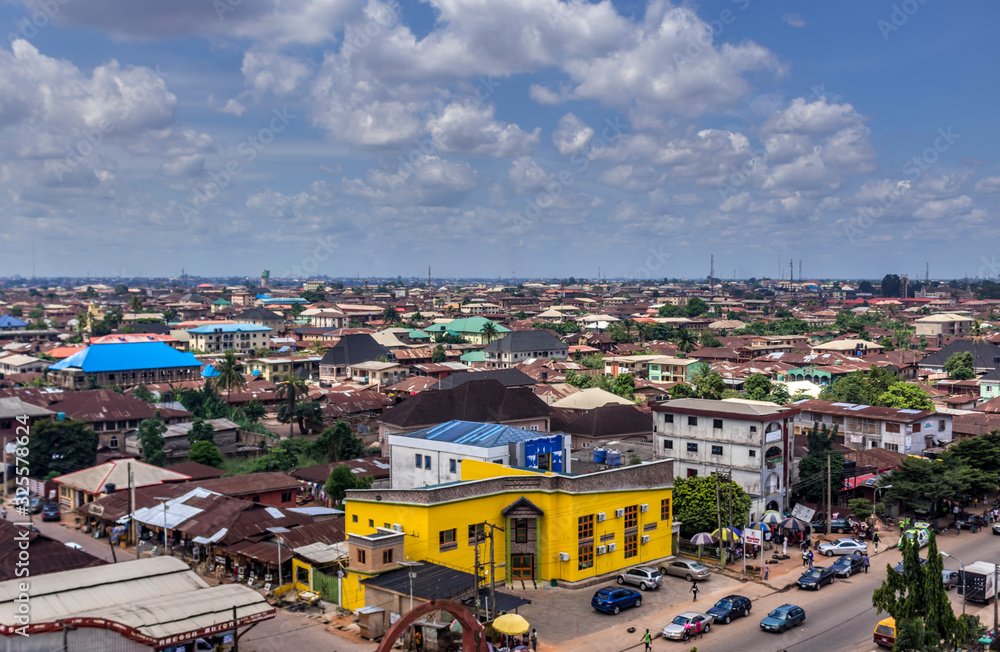Overview
Benin City serves as the capital and largest metropolitan centre of Edo State, situated in southern Nigeria. It ranks as the fourth-most populous city in Nigeria, according to the 2006 national census, after Lagos, Kano, and Ibadan.
Geography
Benin City lies near the Benin River, about 40 km (25 mi) to the north, and is approximately 320 km (200 mi) east of Lagos by road. It shares boundaries with nearby towns such as Agbor, Oghara, and Ekpoma.
Agriculture
The city boasts fertile soil and is central to Nigeria's rubber industry. It is also a significant palm oil producer, affirming its role in the nation's agricultural economy.
Trade
Historically, Benin City was the capital of the Kingdom of Benin, a pre-colonial state that lasted from the 13th to the 19th century. It engaged in trade with Portugal, and later, in 1897, was captured and sacked by a British punitive expedition, leading to the looting of the famed Benin Bronzes.
The Edo people (also called Benin people) are the city's natives. They speak the Edo language and are known for their rich dress culture, beads, body marks, bangles, and raffia work. Subsistence crops include yams, plantains, and cassava.
History
Edo People
Origins of the Ẹdo Empire
- The earliest rulers were the Ogiso dynasty.
- The first Ogiso, Igodo, was succeeded by his son Ere.
Succession Crisis and the Rise of Oduduwa
- Prince Ekaladerhan, son of the last Ogiso, was falsely accused and exiled.
- He fled to Ile-Ife, changed his name to Izoduwa (“I have found prosperity”).
Founding of the Oba Dynasty
- Elders led by Chief Oliha searched for Prince Ekaladerhan.
- Oduduwa refused to return but sent his son Ọranmiyan to rule.
- Ọranmiyan eventually renounced his role and left his son (later Eweka I) to become the first Oba of Benin.
Legacy of Oduduwa
- Around 1470, Ẹwuare renamed the state to Ẹdo.
- The Portuguese later transliterated Ubini to Benin.
European Contact and Colonization
Portuguese Encounter
- In 1485, Portuguese explorers arrived.
- Benin became a hub in the transatlantic trade.
Diplomatic Relations with Portugal
- Oba Ozolua traveled to Lisbon.
- Portuguese introduced Christian missionaries and European technologies.
- Portuguese pidgin was spoken even into the 19th century.
European Descriptions
- Duarte Pacheco Pereira (1508) and Lourenço Pinto (1691) described Benin City's size, architecture, wealth, and order.
British Conquest (1897)
- Led by Admiral Sir Harry Rawson.
- Resulted in destruction, looting, and seizure of the Benin Bronzes.
Human Sacrifice Controversy
- Accounts like Alan Boisragon's (1898) and historian James D. Graham discuss conflicting reports of human sacrifice in Benin.
Benin Bronzes and Colonial Legacy
- Thousands of artifacts were auctioned to fund the expedition.
- The Queen Idia Mask was a key symbol at FESTAC '77.
- Artifacts remain dispersed across Western museums.
- Monarchy was restored in 1914, but colonial rule remained dominant.
Nigerian Independence and Administrative Changes
Post-Colonial Era
- 1960: Nigeria gains independence.
- 1963: Benin becomes capital of the Mid-Western Region.
Renaming and Restructuring
- 1976: Region renamed Bendel State.
- 1991: Bendel split into Edo and Delta States.
- Benin City becomes capital of Edo State.
Climate
General Characteristics
- Tropical monsoon (Köppen Am) climate.
- Year-round temperatures: 25–30°C (77–86°F).
- Humidity often exceeds 60%.
Seasonal Variations
- July–September: Notably overcast and rainy.
Education
Tertiary Institutions
- University of Benin (Ugbowo and Ekenwan campuses)
- College of Education Ekiadolor
- Igbinedion University
- Benson Idahosa University
- Wellspring University
Secondary Schools (Selection)
- Edo College
- Oba Ewuare Grammar School
- Greater Tomorrow Secondary School
- Immaculate Conception College (ICC)
- Idia College
- University of Benin Demonstration Secondary School (UDSS)
- Covenant Christian Academy
- Federal Government Girls College
- And many more...
Environmental Issues
Climate Change
- Rising temperature, humidity, and rainfall trends noted (1981–2015).
Flood Management
- Flooding reported since 1993.
- In June 2020, many were displaced due to poor drainage and neglected flood programs.
Urban Heating
- Benin is on average 0.5°C warmer than rural surroundings.
Waste Management
- 2021 study found widespread public misunderstanding of waste disposal.
- Poor awareness of health and climate impacts of improper waste handling.
Culture
Attractions
- National Museum
- Oba Palace
- Igun Street (renowned for bronze casting)
- Benin Moats (20–40 ft deep)
- Ring Road (King's Square)
- Traditional markets and festivals
Crafts and Sculpture
- Famous for bronze casting, one of the world's oldest monarchies.
Festivals
Igue Festival
- Held annually between Christmas and New Year.
- Renews Oba Ewuare's powers.
- Includes blessing of the land and people.
Benin City Film Festival
- Promotes local and international filmmakers.
- Platform for emerging and professional creatives.
Market Days
- Four major Bini market days:
- Ekioba
- Ekenaka
- Agbado
- Eken
Transportation
- Benin Airport serves the city.
- Airlines:
- Green Africa Airways
- United Nigeria Airlines
- Aero Contractors
- Arik Air
- Air Peace
Gallery
(Images not included in markdown format)
Notable People
(Section to be filled if list is provided)
References
Bibliography
- Bondarenko, D. M. (2005). A Homoarchic Alternative to the Homoarchic State: Benin Kingdom of the Thirteenth - Nineteenth Centuries. Social Evolution & History, 4(2), 18–88.
External Links
- WorldStatesmen – Nigeria
- The Fall of Benin
- Benin Kingdom/Edo State Tourism
- Story of cities #5: Benin City, the mighty medieval capital now lost without trace
